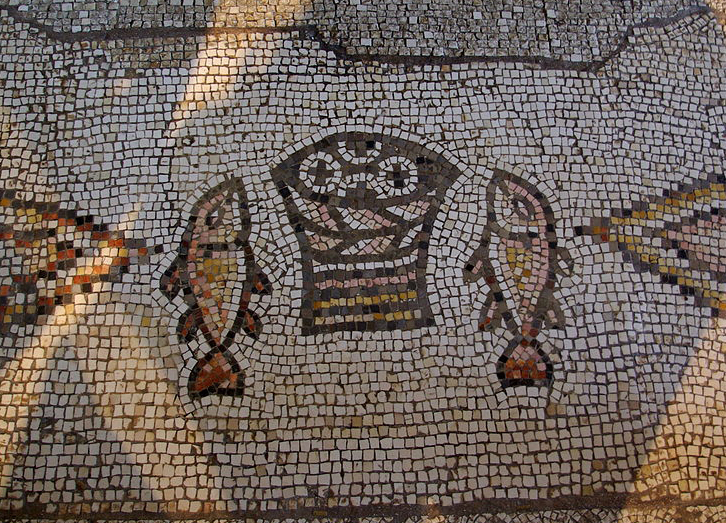Once upon a time, I was a storyteller. I would memorize stories and perform them–sometimes for children, sometimes for adults, sometimes by myself and sometimes in concert with other storytellers. It was a great art form to inhabit and explore, and it deepened my understanding of both story and audience in ways that singing, teaching, and writing had not.
So I suppose I will always bring a bit of the storyteller with me when I read the Bible. I find myself looking for patterns–the bits that give the tale its structure so it will stand in memory. I look for the phrases that cannot be changed in the telling without altering the identity of story (“Trip-trap, trip-trap, trip-trap”). And I look for the words that carry emotion and meaning–the ones that do the work of placing what’s in my brain into yours.
This morning I was reading the Feeding of the Five Thousand in Mark and thinking about mothers and ministry and the nature of God; wondering if the sermon today would try to fit in Mother’s Day; thinking about the things I had learned about God by being a mother. So I really felt the weight of fatigue when Jesus has compassion on the apostles and says to them, “ ‘Come away by yourselves to a lonely place, and rest a while.’ For many were coming and going, and they had no leisure even to eat.”
No time to eat. That phrase is doing some work. What parent hasn’t had a day like that? And going to “a lonely place” doesn’t sound like a vacation, just quiet. Sometimes that’s all you get, but that’s enough.
Jesus and the apostles got into a boat and tried to get away, but the people figured out where they were going and “ran there on foot from all the towns, and got there ahead of them.” The crowd was excited. They didn’t plan ahead. They just flocked to Jesus. And when Jesus comes ashore, he again shows compassion “because they were like sheep without a shepherd.” A phrase that must be kept intact.
The hour grows late, they’re far away from everything, and once again people need to eat.
Hmm. The story returns to the idea of hunger and need. The first time that happened, Jesus gave the apostles a break. What will happen this time?
The apostles want the people to “buy themselves something to eat,” but Jesus says “You give them something to eat.”
Sounds like a Jesus sort of thing to say. Just when you’re tired and hungry, you can’t give any more of yourself to the people in your life who need you (and heaven knows you could use a rest), he commands you to do more.
“You want us to go buy food for all these people?”
Boy, that sounds cranky and argumentative.
“No.”
And then there’s a miracle. Supper was created out of what was on hand. The mystery of generative compassion is made manifest once again.
“And they all ate and were satisfied.” Another phrase to keep.
Probably even the apostles had a chance to sit down at this point. Everybody in that lonely place, sitting and eating together, talking, inwardly digesting the lessons they’d learned. And who knows, maybe when the evening meal was finished and it was time to go home, they all pitched in to clean up the leftovers.



What happened to the Leftovers? Who took them home? No answers for good reason. The message is not about the food but about the feeder (provider) So the song goes, “Be not dismade what ‘er be tide,God will take care of you..”